【教育资料】九年级英语上册第六单元知识点讲解Reading学习专用
人教版九年级上册英语unit6知识点

人教版九年级上册英语unit6知识点九年级上册英语Unit6知识点回顾在九年级上册英语中,Unit6是一个重要的单元,主要涉及到时间的表达和询问,并且包括几个重要的语法结构。
本文将对这些知识点进行回顾,并探讨如何运用这些知识点来提高英语水平。
1. 时间的表达在Unit6中,我们学习了几种表示时间的方法。
首先是使用基数词表示具体的日期,例如:July 1st。
另一种方法是使用序数词表示星期几,例如:Monday。
在具体的时间表达上,我们可以使用24小时制,也可以使用12小时制。
例如:9:30表示上午9点30分,而15:45表示下午3点45分。
此外,我们还学习了表示频率的表达方式,包括always、usually、often、sometimes、seldom和never等。
这些词汇可以帮助我们描述我们日常的活动和习惯。
2. 时间的询问在英语中,询问时间是一个常见的场景。
在Unit6中,我们学习了几种方式来询问时间。
最常见的方式是问"What time is it?",这是一个简单而直接的方式。
当然,我们还可以使用更为复杂的方式来询问,例如:"What's the time now?"或者"What time do you have?"。
这些方式在日常交流中也是常见的。
3. 一般现在时和现在进行时在Unit6中,我们学习了一般现在时和现在进行时两种时态。
一般现在时用于叙述客观事实和常规习惯,例如:"I go to school every day.";现在进行时则用于表示正在进行的动作,例如:"She is watching TV right now."这两种时态在日常英语中非常常见,掌握它们的用法对于提高口语表达能力至关重要。
4. 发表意见和建议在Unit6中,我们还学习了一些表达意见和建议的句子。
九年级上册英语di6单元知识点
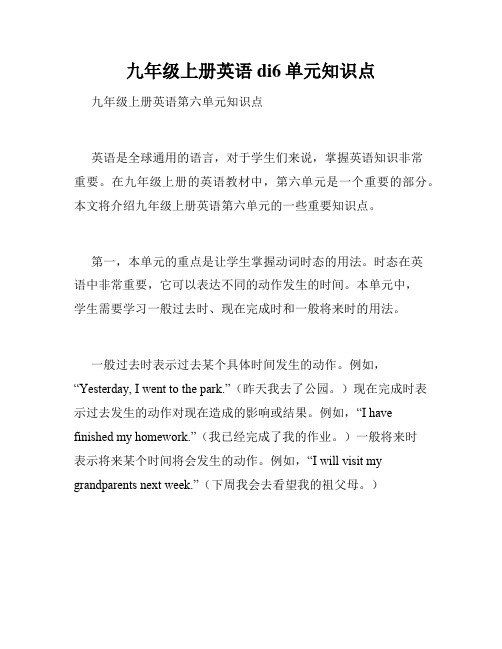
九年级上册英语di6单元知识点九年级上册英语第六单元知识点英语是全球通用的语言,对于学生们来说,掌握英语知识非常重要。
在九年级上册的英语教材中,第六单元是一个重要的部分。
本文将介绍九年级上册英语第六单元的一些重要知识点。
第一,本单元的重点是让学生掌握动词时态的用法。
时态在英语中非常重要,它可以表达不同的动作发生的时间。
本单元中,学生需要学习一般过去时、现在完成时和一般将来时的用法。
一般过去时表示过去某个具体时间发生的动作。
例如,“Yesterday, I went to the park.”(昨天我去了公园。
)现在完成时表示过去发生的动作对现在造成的影响或结果。
例如,“I have finished my homework.”(我已经完成了我的作业。
)一般将来时表示将来某个时间将会发生的动作。
例如,“I will visit my grandparents next week.”(下周我会去看望我的祖父母。
)第二,本单元还涉及到被动语态的用法。
被动语态在英语中常常用来强调动作的承受者而不是执行者。
例如,“The building was destroyed by the ear thquake.”(建筑物被地震摧毁了。
)被动语态的构成通常由be动词的不同形式(am、is、are、was、were)加上过去分词形式来组成。
在学习被动语态时,除了掌握构成的规则之外,学生还需要明确动作发出者的身份。
第三,本单元还涉及到固定搭配的学习。
英语中很多短语和习惯用法都是固定的,学生需要记住它们的用法和意义。
例如,“look after”(照顾),“give up”(放弃),“get on with”(与某人相处)等等。
通过掌握这些固定搭配,学生可以提高自己的语言表达能力。
第四,本单元也包括了一些数词的用法。
数词在英语中用来表示数量或顺序。
学生需要学习基数词(如one,two,three)和序数词(如first,second,third)的用法。
九年级上册英语unit6知识点归纳

九年级上册英语unit6知识点归纳在九年级上册的英语教材中,unit6是一个关于旅行的单元。
本单元主要涉及旅行的话题,探索不同国家和文化的差异,以及与旅行有关的必备知识和技巧。
在这篇文章中,我们将对unit6的知识点进行归纳和总结,帮助同学们更好地理解和掌握这些内容。
句型和语法:本单元中,我们学习了许多关于旅行的常用句型和语法结构。
比如,在询问或描述旅行计划时,我们可以使用以下句型:1. Are you planning to visit any famous landmarks?你计划参观一些著名的地标吗?2. I'm going to visit the Great Wall next week.下周我打算去参观长城。
3. Have you ever been to the Eiffel Tower?你去过埃菲尔铁塔吗?除了这些常见句型外,本单元还涉及到了被动语态、宾语从句以及时间状语从句等语法结构。
例如:1. The hotel was built last year.这家酒店是去年建的。
(被动语态)2. My friend told me that he would go to Japan.我朋友告诉我他将去日本。
(宾语从句)3. After I finish my exams, I will go on a trip.我考试结束后,我会去旅行。
(时间状语从句)这些语法结构对于准确表达和理解旅行计划以及与他人交谈都非常重要,同学们要多做练习以加深对这些结构的理解和应用。
相关词汇和短语:在unit6中,我们还学习了许多与旅行有关的重要词汇和短语,这些词汇和短语不仅可以帮助我们进行旅行计划的讨论,也可以用于描述旅行体验和感受。
一些常用的词汇和短语包括:1. tourist attractions旅游景点2. cultural differences文化差异3. local cuisine当地美食4. souvenir纪念品在我们进行英语口语交流时,运用这些词汇和短语可以让我们的表达更加准确和流利。
人教版九年级英语上册unit6知识点
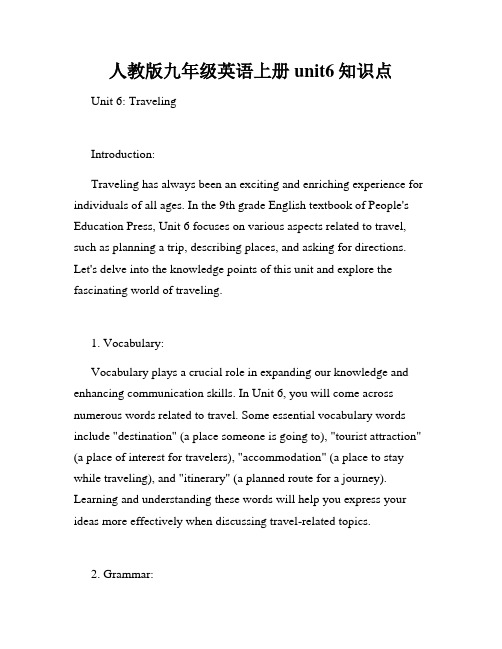
人教版九年级英语上册unit6知识点Unit 6: TravelingIntroduction:Traveling has always been an exciting and enriching experience for individuals of all ages. In the 9th grade English textbook of People's Education Press, Unit 6 focuses on various aspects related to travel, such as planning a trip, describing places, and asking for directions. Let's delve into the knowledge points of this unit and explore the fascinating world of traveling.1. Vocabulary:Vocabulary plays a crucial role in expanding our knowledge and enhancing communication skills. In Unit 6, you will come across numerous words related to travel. Some essential vocabulary words include "destination" (a place someone is going to), "tourist attraction"(a place of interest for travelers), "accommodation" (a place to stay while traveling), and "itinerary" (a planned route for a journey). Learning and understanding these words will help you express your ideas more effectively when discussing travel-related topics.2. Grammar:Grammar forms the foundation of any language. In Unit 6, you will learn valuable grammar concepts that can assist you in building grammatically correct sentences while discussing travel experiences. For instance, you will familiarize yourself with the use of present continuous tense when talking about future travel plans. Additionally, the unit also introduces the concept of reported speech, enabling you to recount conversations or recommendations regarding travel.3. Reading Comprehension:Unit 6 consists of various reading passages that aim to improve your reading comprehension skills. These passages cover diverse topics related to travel, including hotel reviews, travel brochures, and articles about tourist destinations. By reading and understanding these passages, you will not only enhance your vocabulary but also develop your ability to grasp information from written texts.4. Speaking and Listening:Effective communication is a vital component of any travel experience. Unit 6 provides ample opportunities to improve your speaking and listening skills. Through dialogues and group activities, you will learn how to ask for directions, describe places, and talk about travel experiences. These activities encourage teamwork and foster an interactive learning environment.5. Writing:Unit 6 also focuses on developing your writing skills. You will learn different writing formats, such as brochures and postcards, enabling you to effectively convey information about travel destinations. Additionally, you will practice writing travel itineraries, allowing you to plan and organize your own trips. These writing exercises aim to sharpen your composition skills and enhance your ability to convey information concisely.Conclusion:Unit 6 of the 9th-grade English textbook provides a comprehensive understanding of travel-related topics. By delving into vocabulary, grammar, reading comprehension, speaking, listening, and writing exercises, you can develop crucial language skills necessary for expressing your ideas and experiences related to travel. Remember, the knowledge gained from this unit is not limited to the classroom but can be applied to real-life situations, enriching your future travel experiences. So, gear up and embark on an exciting linguistic journey in the world of travel!。
九年级英语上册第六单元知识点讲解Reading

九年级英语上册第六单元知识点讲解TV programsReading重点单词1 coming adj. 即将降临的coming作形容词,意为“即将降临的,即将发生的",常用于Monday, Tuesday,week ,weekend ,month, year等词前作定语。
e.g. We will have a meeting the coming week.下周我们将开一次会。
拓展coming还可作名词,意为“某事物/某人的到来(降临)〞。
e.g. With the coming of railways ,new markets opened up.铁路的建成翻开了新的市场。
2 cover v.报道,电视报道e.g. This TV station will cover the concert.这家电视台将报道这场音乐会。
拓展cover作动词时还可以表示“涉及;包括;覆盖〞等意思。
e.g. The speeches covered a lot of subjects.这些演讲涉及的内容极为广泛。
Much of the country is covered by forest.森林覆盖着这个国家的大片土地。
3 live adv, 现场直播,实况转播live作副词,意为“现场直播,实况转播〞。
live 还可作形容词,意为“现场直播的,实况转播的〞e.g. The show is going out live now.这场演出如今正在实况直播。
(作副词)小提示live作形容词时,通常用于名词前作定语。
There will be live TV coverage of tonight's big match.电视将实况转播今晚的浩大比赛。
(作形容词)4 direct vt, 导演;指导e.g. Who directed the film?谁导演这部影片?拓展direct 还可作形容词,意为“直接的;笔直的,径直的(中间不停或不改变方向的)〞。
九年级上册unit6单元知识点归纳
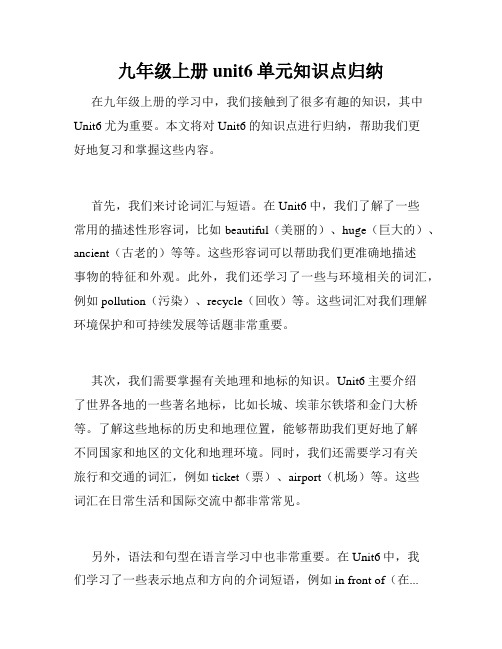
九年级上册unit6单元知识点归纳在九年级上册的学习中,我们接触到了很多有趣的知识,其中Unit6尤为重要。
本文将对Unit6的知识点进行归纳,帮助我们更好地复习和掌握这些内容。
首先,我们来讨论词汇与短语。
在Unit6中,我们了解了一些常用的描述性形容词,比如beautiful(美丽的)、huge(巨大的)、ancient(古老的)等等。
这些形容词可以帮助我们更准确地描述事物的特征和外观。
此外,我们还学习了一些与环境相关的词汇,例如pollution(污染)、recycle(回收)等。
这些词汇对我们理解环境保护和可持续发展等话题非常重要。
其次,我们需要掌握有关地理和地标的知识。
Unit6主要介绍了世界各地的一些著名地标,比如长城、埃菲尔铁塔和金门大桥等。
了解这些地标的历史和地理位置,能够帮助我们更好地了解不同国家和地区的文化和地理环境。
同时,我们还需要学习有关旅行和交通的词汇,例如ticket(票)、airport(机场)等。
这些词汇在日常生活和国际交流中都非常常见。
另外,语法和句型在语言学习中也非常重要。
在Unit6中,我们学习了一些表示地点和方向的介词短语,例如in front of(在...前面)、behind(在...后面)等。
掌握这些句型和用法,能够帮助我们更自如地描述和指示方位,提高语言表达的准确性和流利度。
除此之外,我们还学习了一些“过去进行时”和“过去完成时”的用法。
这些时态的掌握对我们准确描述过去发生的事情非常重要,同时也能够提高我们的阅读和听力理解能力。
最后,我们需要了解一些与环境保护和可持续发展相关的话题。
在Unit6中,我们学习了一些环保的方法和措施,例如节约用水、减少废物等。
这些话题对我们拓宽视野、培养环保意识非常重要。
我们还了解了一些国际组织和活动,如绿色和平组织和地球一小时等。
了解这些组织和活动,有助于我们深入了解环保工作的重要性和紧迫性。
总结起来,九年级上册Unit6单元的知识点主要包括词汇与短语、地理和地标、语法和句型以及环境保护和可持续发展等方面。
新人教版九年级英语UNIT6知识点讲义

新人教版九年级英语UNIT6知识点讲义在九年级英语学习中,UNIT6是一个重要的单元,涵盖了许多重要的知识点。
本文将对新人教版九年级英语UNIT6的知识点进行详细的讲解,希望对同学们的学习有所帮助。
一、重点单词1. connect(v.)-连接例句:We need to connect the two wires to have electricity.词组:connect with与...连接2. educate(v.)-教育例句:Parents have the responsibility to educate their children.词组:receive an education接受教育3. remove(v.)-移除例句:Please remove your shoes before entering the house.词组:remove from...从...中移除4. influence(n.)-影响例句:His speech had a great influence on the audience.词组:have an influence on对...有影响5. generation(n.)-一代人例句:Each generation brings something new to the world.词组:the older generation年纪较大的一代人6. worldwide(adj.)-全球的例句:The internet has made communication worldwide much easier.词组:all over the world全球各地二、重点短语1. take up开始从事例句:She decided to take up painting after retirement.2. set up建立例句:He set up his own company after years of hard work.3. make progress取得进步例句:With hard work, she made great progress in her English studies.4. look up查寻例句:If you don't know the meaning of a word, you can look it up in the dictionary.5. break down(机器等)出故障例句:The car broke down on the way to the airport.6. be addicted to对...上瘾例句:He is addicted to playing video games and spends too much time on them.三、重点语法1. 定语从句定语从句是指在句子中修饰名词或代词的从句。
九上英语unit6知识点总结
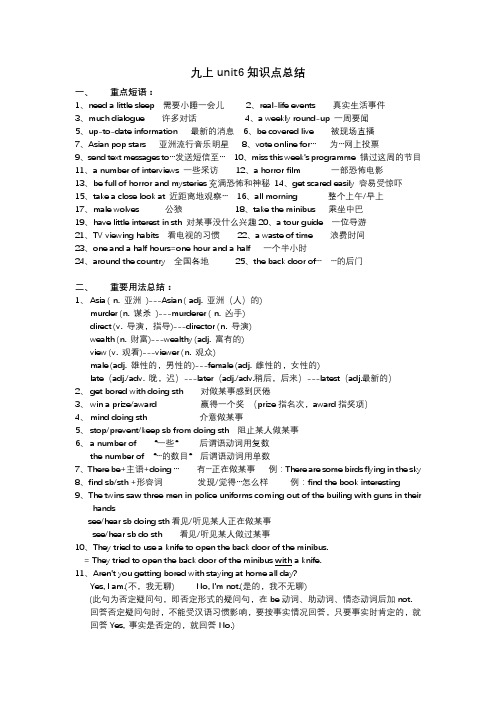
九上unit6知识点总结一、重点短语:1、need a little sleep 需要小睡一会儿2、real-life events 真实生活事件3、much dialogue 许多对话4、a weekly round-up 一周要闻5、up-to-date information 最新的消息6、be covered live 被现场直播7、Asian pop stars 亚洲流行音乐明星8、v ote online for…为…网上投票9、send text messages to…发送短信至…10、m iss this week’s programme错过这周的节目11、a number of interviews 一些采访12、a horror film 一部恐怖电影13、be full of horror and mysteries充满恐怖和神秘14、get scared easily 容易受惊吓15、take a close look at 近距离地观察…16、all morning 整个上午/早上17、male wolves 公狼18、take the minibus 乘坐中巴19、have little interest in sth 对某事没什么兴趣20、a tour guide 一位导游21、TV viewing habits 看电视的习惯22、a waste of time 浪费时间23、one and a half hours=one hour and a half 一个半小时24、around the country 全国各地25、the back door of……的后门二、重要用法总结:1、Asia ( n. 亚洲)---Asian ( adj. 亚洲(人)的)murder (n. 谋杀)---murderer ( n. 凶手)direct (v. 导演,指导)---director (n. 导演)wealth (n. 财富)---wealthy (adj. 富有的)view (v. 观看)---viewer (n. 观众)male (adj. 雄性的,男性的)---female (adj. 雌性的,女性的)late(adj./adv. 晚,迟)---later(adj./adv.稍后,后来)---latest(adj.最新的)2、get bored with doing sth 对做某事感到厌倦3、win a prize/award 赢得一个奖(prize指名次,award指奖项)4、mind doing sth 介意做某事5、stop/prevent/keep sb from doing sth 阻止某人做某事6、a number of “一些“后谓语动词用复数the number of “…的数目“后谓语动词用单数7、There be+主语+doing … 有…正在做某事例:There are some birds flying in the sky8、find sb/sth +形容词发现/觉得…怎么样例:find the book interesting9、The twins saw three men in police uniforms coming out of the builing with guns in theirhandssee/hear sb doing sth看见/听见某人正在做某事see/hear sb do sth 看见/听见某人做过某事10、They tried to use a knife to open the back door of the minibus.= They tried to open the back door of the minibus with a knife.11、A ren’t you getting bored with staying at home all day?Yes, I am.(不,我无聊) No, I’m not.(是的,我不无聊)(此句为否定疑问句,即否定形式的疑问句,在be动词、助动词、情态动词后加not.回答否定疑问句时,不能受汉语习惯影响,要按事实情况回答,只要事实时肯定的,就回答Yes, 事实是否定的,就回答No.)三、重点语法:(条件状语从句)1、if 译为“是否”引导宾语从句。
人教版九年级上册unit6知识点

人教版九年级上册unit6知识点人教版九年级上册Unit 6知识点总结九年级上册的英语教材中,Unit 6是一个关于旅行的单元。
在这个单元里,我们学习了很多与旅行相关的词汇和句型,也学习了一些关于不同国家和城市的文化和地理知识。
在接下来的文章中,我们将就这个单元的重点知识进行总结。
首先,我们来看一下本单元中关于旅行的基础词汇。
在这个单元中,我们学习了很多有关旅行的动词和名词,比如book,plane,train,passport,ticket等等。
这些词汇在我们的日常交流中是非常常用的,掌握它们可以帮助我们更好地表达和理解有关旅行的话题。
除了基础词汇,我们还学习了一些关于询问和提供信息的句型。
比如,当我们想询问某个国家或城市有哪些著名景点时,可以使用"What are the famous places in...?"这样的句型。
当我们想向别人提供旅行建议时,可以使用"You should..."或者"If I were you, I would..."这样的句型。
这些句型的掌握可以帮助我们在旅行或和他人交流时更加流利地表达自己的意思。
在这个单元中,我们也学习了一些关于世界各国和城市的文化和地理知识。
例如,我们了解了巴黎是法国的首都,拥有埃菲尔铁塔和卢浮宫等著名景点;我们了解了美国是一个多元文化的国家,有纽约、洛杉矶等世界级的大城市;我们还了解了伦敦是英国的首都,拥有大本钟和白金汉宫等知名景点。
通过学习这些知识,我们可以更好地了解不同国家和城市的特点,增加对世界的认知。
此外,我们在这个单元中还学习了如何写一篇旅行日记。
写旅行日记是记录旅行经历的一种方式,通过写作可以帮助我们更好地回忆和分享自己的旅行经历。
在写旅行日记时,我们需要用到一些关于时间、地点、景点、感受等方面的词汇和句子。
例如,我们可以写下自己旅行的日期,描述参观的景点,写下自己的感受和体验等等。
牛津译林版九年级上册unit6知识点

牛津译林版九年级上册unit6知识点回顾九年级上册的第六单元是一个关于记叙文的单元,主要介绍了记叙文的写作技巧和方法。
通过学习这个单元,我们可以提高自己的写作能力,同时也能更好地理解和阅读记叙文。
本文将回顾九年级上册unit6所涉及的知识点。
首先,我们来回顾一下记叙文的特点和写作要领。
记叙文是以事件为线索,按照时间顺序将事件通过描述、描写、叙述等手法展开的一种文体。
记叙文通常包括三个部分:开头引入事件,中间组织事件,结尾总结事件。
在写记叙文时,我们要注意运用生动的语言描写,注意情节的起伏扭转以及人物形象的刻画。
同时,我们还要注重行文的连贯性和流畅性,使读者能够一气呵成地读完整篇文章。
其次,本单元还介绍了记叙文中的常用写作手法。
比如,描写是记叙文中必不可少的一种写作手法。
描写可以通过形容词、形容词短语、比喻、拟人等手法来展开。
这样,读者可以通过描写更加生动地感受到事件发生的场景,形象和气氛。
另外,对话是记叙文中刻画人物形象和传递信息的一种重要手法。
适当设置对话可以使故事更加有趣,也更容易引起读者的共鸣。
同时,引用描写也是记叙文中常用的手法之一。
引用描写可以通过引用名人名句、诗词、谚语等方式来丰富文中内容,使文章增色不少。
此外,九年级上册unit6还介绍了如何构思记叙文的主题和情节。
一个好的主题和情节能够使记叙文更加有吸引力和说服力。
在选择主题时,我们应该关注一些普遍的、具有代表性的话题,这样能够引起更多读者的兴趣。
另外,一个好的情节要具有起伏扭转,有悬念,同时还要与主题紧密相关。
可以通过安排冲突、设置障碍、引入转折等手法来丰富情节,增加读者的阅读体验。
最后,本单元还包括记叙文的阅读欣赏。
通过阅读优秀的记叙文,我们可以学习到很多优秀的写作技巧和方法。
同时,欣赏他人的作品也能够开拓我们的思路,激发我们自己的创作灵感。
在阅读记叙文时,我们要注意作者的写作理念、行文章法和情绪表达,同时还要留意作者使用的修辞手法和描写手法。
译林版九年级上册英语Unit 6 reading知识点总结梳理-
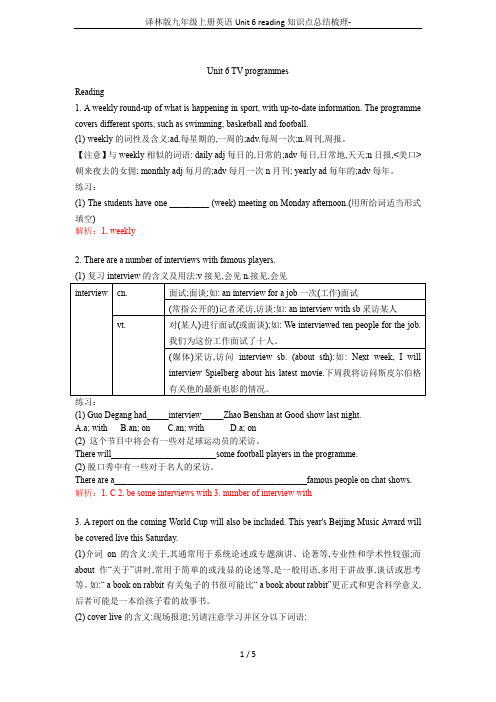
Unit 6 TV programmesReading1.A weekly round-up of what is happening in sport, with up-to-date information. The programme covers different sports, such as swimming, basketball and football.(1)weekly的词性及含义:ad.每星期的,一周的;adv.每周一次;n.周刊,周报。
【注意】与weekly相似的词语: daily adj每日的,日常的;adv每日,日常地,天天;n日报,<美口>朝来夜去的女佣; monthly adj每月的;adv每月一次n月刊; yearly ad每年的;adv每年。
练习:(1) The students have one _________ (week) meeting on Monday afternoon.(用所给词适当形式填空)解析:1. weekly2.There are a number of interviews with famous players.练习:(1) Guo Degang had_____interview_____Zhao Benshan at Good show last night.A.a; withB.an; onC.an; withD.a; on(2) 这个节目中将会有一些对足球运动员的采访。
There will________________________some football players in the programme.(2)脱口秀中有一些对于名人的采访。
There are a____________________________________________famous people on chat shows. 解析:1. C 2. be some interviews with 3. number of interview with3. A report on the coming World Cup will also be included. This year's Beijing Music Award will be covered live this Saturday.(1)介词on的含义:关于,其通常用于系统论述或专题演讲、论著等,专业性和学术性较强;而about作“关于”讲时,常用于简单的或浅显的论述等,是一般用语,多用于讲故事,谈话或思考等。
人教版九年级上册英语u6知识点
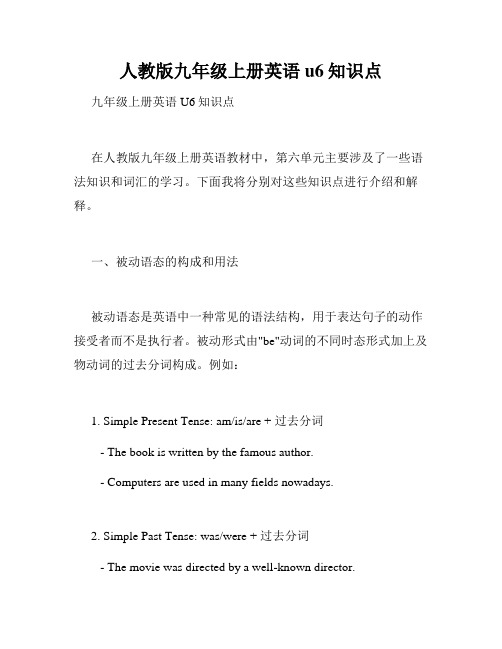
人教版九年级上册英语u6知识点九年级上册英语U6知识点在人教版九年级上册英语教材中,第六单元主要涉及了一些语法知识和词汇的学习。
下面我将分别对这些知识点进行介绍和解释。
一、被动语态的构成和用法被动语态是英语中一种常见的语法结构,用于表达句子的动作接受者而不是执行者。
被动形式由"be"动词的不同时态形式加上及物动词的过去分词构成。
例如:1. Simple Present Tense: am/is/are + 过去分词- The book is written by the famous author.- Computers are used in many fields nowadays.2. Simple Past Tense: was/were + 过去分词- The movie was directed by a well-known director.- The house was built in the 19th century.3. Simple Future Tense: will be + 过去分词- The assignment will be finished by tomorrow.- The party will be held at the community center.被动语态在英语表达中经常用于强调动作接受者,或者当我们不知道或不关心动作的执行者时。
二、情态动词的用法和意义情态动词是英语中的一类特殊的辅助动词,用来表达说话人的态度、意愿、能力、推测等。
常见的情态动词有can, could, may, might, must, shall, should, will, would等。
它们具有以下特点:1. 不能单独使用,必须与动词原形搭配,形成情态动词短语。
例如:- She can swim.- They should study harder.2. 情态动词没有人称和数的变化。
英语九年级上册unit6知识点
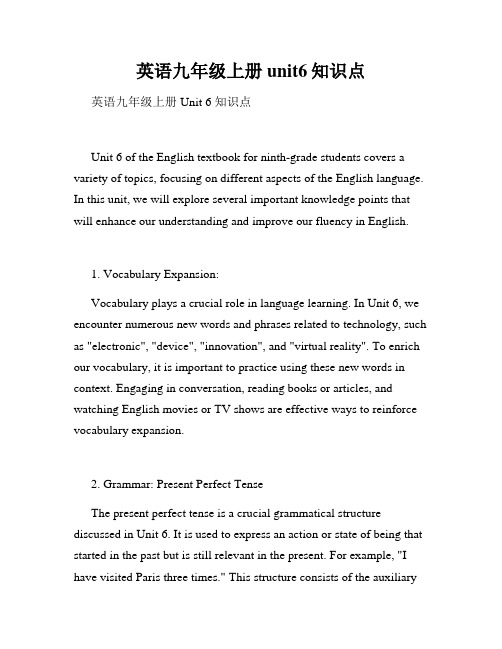
英语九年级上册unit6知识点英语九年级上册 Unit 6 知识点Unit 6 of the English textbook for ninth-grade students covers a variety of topics, focusing on different aspects of the English language. In this unit, we will explore several important knowledge points that will enhance our understanding and improve our fluency in English.1. Vocabulary Expansion:Vocabulary plays a crucial role in language learning. In Unit 6, we encounter numerous new words and phrases related to technology, such as "electronic", "device", "innovation", and "virtual reality". To enrich our vocabulary, it is important to practice using these new words in context. Engaging in conversation, reading books or articles, and watching English movies or TV shows are effective ways to reinforce vocabulary expansion.2. Grammar: Present Perfect TenseThe present perfect tense is a crucial grammatical structure discussed in Unit 6. It is used to express an action or state of being that started in the past but is still relevant in the present. For example, "I have visited Paris three times." This structure consists of the auxiliaryverb "have" or "has" followed by the past participle form of the main verb. Gaining proficiency in using the present perfect tense requires practice in various contexts, such as talking about personal experiences, discussing achievements, or describing recent events.3. Reading Comprehension Strategies:Unit 6 provides us with a range of reading materials, including news articles, interviews, and short stories. To enhance our reading comprehension, we can employ several strategies. Skimming the text to get an overview, scanning for specific information, and identifying the main idea and supporting details are effective strategies in comprehending English texts. Additionally, highlighting and making notes about important information can aid in understanding and retention.4. Listening Skills:Developing strong listening skills is essential for effective communication in English. Unit 6 presents various listening tasks, such as interviews, presentations, and dialogues. To improve our listening abilities, we can practice listening to English podcasts, watching English videos, or engaging in conversations with native English speakers. Additionally, focusing on key words and phrases, payingattention to intonation and stress, and practicing active listening can enhance our overall listening comprehension.5. Speaking Practice:Unit 6 provides opportunities for us to practice speaking English through group discussions, role plays, and presentations. Engaging in these activities enables us to express our opinions, practice using new vocabulary and grammar structures, and develop our fluency. To further improve our speaking skills, it is beneficial to engage in conversations with English-speaking individuals or join language exchange programs where we can interact with native speakers.6. Writing Skills:The unit also emphasizes writing skills, encouraging students to express their thoughts and ideas through various writing tasks, such as emails, formal letters, and essays. To enhance our writing abilities, we should focus on organizing our ideas coherently, using appropriate vocabulary and grammar, and editing and revising our work for clarity and accuracy. Practicing writing regularly, seeking feedback from teachers or peers, and reading well-written English texts will contribute to our growth as writers.In conclusion, Unit 6 of the English ninth-grade textbook comprises a diverse range of knowledge points aimed at improving our English language proficiency. From expanding our vocabulary and understanding grammar structures to enhancing reading, listening, speaking, and writing skills, these knowledge points provide valuable insights and strategies for language acquisition. By actively engaging in practice, seeking opportunities for exposure, and persistently working on these skills, we can strengthen our overall English proficiency and fluency.。
九上Unit 6 Reading [2]知识点
![九上Unit 6 Reading [2]知识点](https://img.taocdn.com/s3/m/aa4feac26137ee06eff91841.png)
10. Detective Lu added that the police are now checking the scene for fingerprints and other clues.
Detective stories
Reading [2]
Language points
1. He was last seen leaving his office in New Town at about 7 p.m.
人们最后看到他是在晚上大约七点他离开新 镇的办公室的时候。
was seen leaving 是被动语态 see sb. doing sth. 看见某人正在做某事 被动形式: sb. be seen doing sth. 比较: see sb. do sth. 看见某人做了某事 [看见全过程/经常] 被动形式:sb. be seen to do sth. 类似词有:watch, hear, listen to, find, look, notice等。 Eg. She was found _______ (cry) when I passed by. crying Tina is often heard ______ (sing) in her room. to sing
They lit a fire and put up a tent. 搭起了帐篷 Please help me put up the map. 挂起这张地图 They are busy putting up a tall building. 建造大楼 Please put up your hand if you find the answer. 举手
他们还在犯罪现场工作着,想找出受害者是在其 他地方被杀,然后移尸谷镇,还是他被发现的地 方就是第一凶杀现场。
英语九年级上册unit 6单元知识点总结
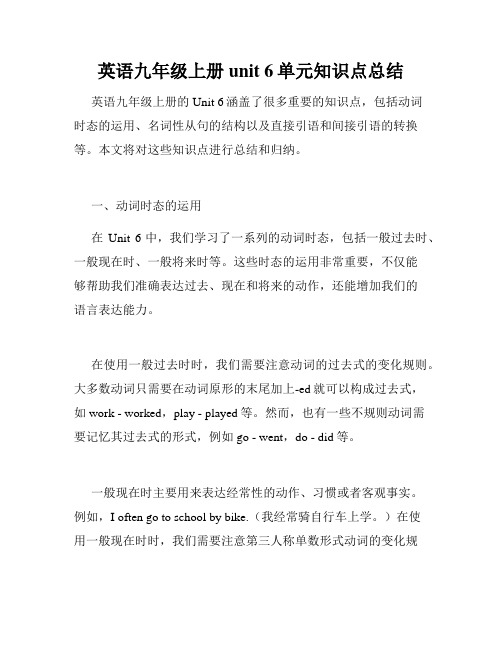
英语九年级上册unit 6单元知识点总结英语九年级上册的Unit 6涵盖了很多重要的知识点,包括动词时态的运用、名词性从句的结构以及直接引语和间接引语的转换等。
本文将对这些知识点进行总结和归纳。
一、动词时态的运用在Unit 6中,我们学习了一系列的动词时态,包括一般过去时、一般现在时、一般将来时等。
这些时态的运用非常重要,不仅能够帮助我们准确表达过去、现在和将来的动作,还能增加我们的语言表达能力。
在使用一般过去时时,我们需要注意动词的过去式的变化规则。
大多数动词只需要在动词原形的末尾加上-ed就可以构成过去式,如work - worked,play - played等。
然而,也有一些不规则动词需要记忆其过去式的形式,例如go - went,do - did等。
一般现在时主要用来表达经常性的动作、习惯或者客观事实。
例如,I often go to school by bike.(我经常骑自行车上学。
)在使用一般现在时时,我们需要注意第三人称单数形式动词的变化规则,即在动词原形的末尾加上-s或者-es,如run - runs,watch - watches等。
一般将来时由助动词will和动词原形构成,主要用来表示将要发生的动作或者计划中的事情。
例如,I will visit my grandparents tomorrow.(我明天要去看望我的祖父母。
)在使用一般将来时时,我们还需要注意其他一些表示将来的词语,如tomorrow(明天)、next week(下周)等。
二、名词性从句的结构名词性从句是一个由连接词(引导词)引导的句子,起名词的作用。
在Unit 6中,我们学习了几种常用的引导词,如that, what, who, which等。
名词性从句可以用作主语、宾语、表语或者补足语。
例如,What he said surprised me.(他说的话让我感到惊讶。
)在这个例句中,名词性从句“What he said”作为宾语出现。
人教版英语九年级上册unit6知识点总结

人教版英语九年级上册unit6知识点总结九年级上册英语 Unit 6 知识点总结英语学习中的一个重要环节是掌握基础知识。
在九年级上册的英语课程中,Unit 6 是学习重点之一。
本文将对 Unit 6 的知识点进行总结,帮助同学们更好地掌握和理解课程内容。
本单元主要学习了环保的话题。
首先是学习了一些有关环保的词汇,如“recycle”(回收利用)、“reuse”(再利用)和“reduce”(减少)等。
接着学习了一些有关环境问题的短语,如“throw away rubbish”(扔垃圾)、“save energy”(节约能源)和“plant trees”(种树)等。
这些词汇和短语在日常生活中非常常见,通过学习它们,同学们可以更好地表达自己对环保的看法和采取行动。
除了词汇和短语,本单元还学习了一些语法知识。
其中一项重要的内容是表示数量和复数的规则。
在英语中,名词的复数形式一般在词尾加上“-s”或“-es”。
此外,还有一些不规则的复数形式,如“child”(复数形式为“children”)和“man”(复数形式为“men”)。
要正确使用名词的复数形式,同学们需要记住这些规则和不规则规律。
另一个重要的语法知识点是情态动词的用法。
情态动词包括can、could、may、might、shall、should、will、would、must 和ought to 等。
它们可以用来表示能力、可能性、义务和推测等。
在句子中,情态动词通常用来帮助表达情感、态度和推测,因此在使用时要根据语境和意义来选择正确的情态动词。
本单元还涉及到了一些阅读和写作技巧。
在阅读方面,同学们学习了如何从文章中获取关键信息,如主题、中心思想和细节等。
同时,通过阅读理解不同类型的文章,同学们还可以提高自己的阅读理解能力。
在写作方面,同学们学习了如何用英语写一封感谢信和一篇环保宣言。
写作时要注意使用合适的语言和句式,以及运用所学到的词汇和短语,使文章更具表达力和说服力。
九年级上unit6知识点
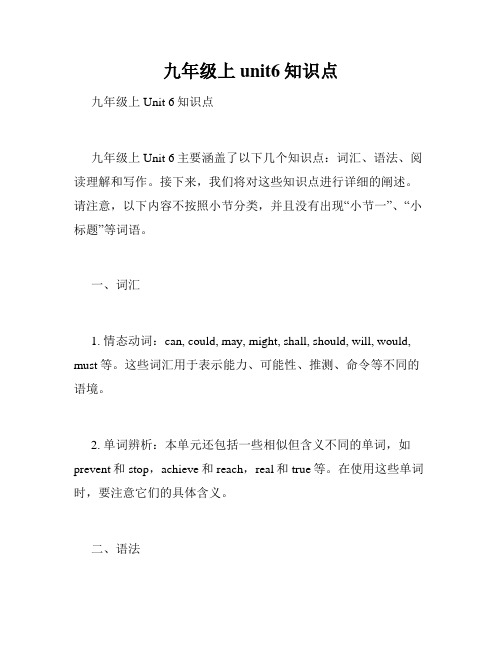
九年级上unit6知识点九年级上Unit 6知识点九年级上Unit 6主要涵盖了以下几个知识点:词汇、语法、阅读理解和写作。
接下来,我们将对这些知识点进行详细的阐述。
请注意,以下内容不按照小节分类,并且没有出现“小节一”、“小标题”等词语。
一、词汇1. 情态动词:can, could, may, might, shall, should, will, would, must等。
这些词汇用于表示能力、可能性、推测、命令等不同的语境。
2. 单词辨析:本单元还包括一些相似但含义不同的单词,如prevent和stop,achieve和reach,real和true等。
在使用这些单词时,要注意它们的具体含义。
二、语法1. 时态:九年级上Unit 6涉及到一些重要的时态,包括一般现在时、一般过去时、一般将来时和现在进行时。
在运用这些时态时,需要注意动词的变化和句子的结构。
2. 宾语从句:本单元还介绍了宾语从句的用法。
宾语从句通常由连接词that或wh-引导,并在主句中作宾语。
例如:“He said that he was busy.”3. 条件句:条件句分为三种类型:零条件句、一般条件句和虚拟条件句。
在条件句中,要注意条件从句和主句之间的时态和语序。
三、阅读理解1. 阅读技巧:在阅读理解题中,我们需要注意细节理解、推理判断和主旨归纳等不同类型问题。
可以通过仔细阅读短文、标记关键信息和进行逻辑推理来解答问题。
2. 题型分析:九年级上Unit 6的阅读理解包括多项选择、填空和简答题等不同类型。
在回答问题时,要准确抓住问题的要点,并结合短文进行分析。
四、写作1. 书信写作:本单元包括了一篇关于自我介绍的书信写作任务。
在写作时,需要注意礼貌用语、句子的连贯性和正确的书信格式。
2. 句子连接:为了使写作更加流畅,我们需要使用适当的句子连接词,如and, but, because, however, therefore等。
九上英语第6单元知识点

九上英语第6单元知识点When was it invented?这单元的学习内容你都掌握了多少呢?接下来店铺为你整理了九上英语第6单元知识点,一起来看看吧。
九上英语第6单元知识点:重点短语1.It's my pleasure.= My pleasure. 我的荣幸2.seem+to+动词原形好像做某事3.such a great invention 如此伟大的一项发明4.think of = think about 想到,考虑5.in our daily lives 在我们的日常生活中6.in my daily life在我的日常生活中7.have a point 有道理8.by accident 偶然地,意外地9.over an open fire 在篝火上10.It is said that 据说11.It is believed that人们相信12.fall into(过去式fell into)=drop into掉进…13.in the 19th century 在19世纪14.spread to other countries 传播到其他国家15.at a low price 以很低的价格16.bring(brought) sth. to sp.把某物带到某处17.all of a sudden 突然地18.less than少于,不到more than = over 超过19.without doubt 毫无疑问20.at that time 在那时21.advise sb (not) to do sth建议某人(不要)做某事22.start doing sth 开始做某事23.work on sth 致力于某事24.(be) similar to 与……相似25.the Olympics 奥运会26.by mistake 错误地,无意地27.make a mistake 犯错28.divide ...into…把…分成…29.in the end = at last = finally 最后30.at the same time 同时九上英语第6单元知识点:重点句型1.give sth. to sb.I gave a pen to him. 我给他一支笔。
- 1、下载文档前请自行甄别文档内容的完整性,平台不提供额外的编辑、内容补充、找答案等附加服务。
- 2、"仅部分预览"的文档,不可在线预览部分如存在完整性等问题,可反馈申请退款(可完整预览的文档不适用该条件!)。
- 3、如文档侵犯您的权益,请联系客服反馈,我们会尽快为您处理(人工客服工作时间:9:00-18:30)。
九年级英语上册第六单元知识点讲解TV programsReading重点单词1 coming adj. 即将来临的coming作形容词,意为“即将来临的,即将发生的",常用于Monday, Tuesday,week ,weekend ,month, year等词前作定语。
e.g. We will have a meeting the coming week.下周我们将开一次会。
拓展coming还可作名词,意为“某事物/某人的到来(降临)”。
e.g. With the coming of railways ,new markets opened up.铁路的建成打开了新的市场。
2 cover v.报道,电视报道e.g. This TV station will cover the concert.这家电视台将报道这场音乐会。
拓展cover作动词时还可以表示“涉及;包括;覆盖”等意思。
e.g. The speeches covered a lot of subjects.这些演讲涉及的内容极为广泛。
Much of the country is covered by forest.森林覆盖着这个国家的大片土地。
3 live adv, 现场直播,实况转播live作副词,意为“现场直播,实况转播”。
live 还可作形容词,意为“现场直播的,实况转播的”e.g. The show is going out live now.这场演出现在正在实况直播。
(作副词)小提示live作形容词时,通常用于名词前作定语。
There will be live TV coverage of tonight's big match.电视将实况转播今晚的盛大比赛。
(作形容词)4 direct vt, 导演;指导e.g. Who directed the film?谁导演这部影片?拓展direct 还可作形容词,意为“直接的;笔直的,径直的(中间不停或不改变方向的)”。
e.g. I'm not in direct contact with them.我和他们没有直接的联系。
Which is the most direct route to London? 哪条是到伦敦最直接的路线?5 latest adj.最新的,最近的巧记late( 迟到的) + st lateste.g. Have you heard the latest news?你得到最新消息了吗?This is her latest novel. 这是她最近出版的小说。
拓展latest还可作名词,意为“最新事物;最新消息”,常与介词in连用。
e.g. This is the latest in robot technology.这是最新的机器人技术。
短语at the latest最迟,最晚e.g. I should be back by 11 o'clock at the latest. 我最迟11点会回来。
重点短语1 a number of一些e.g. A number of visitors come to visit our city every year.每年都会有一些游客来参观我们的城市。
2 take a close look at仔细地看e.g. This document is very important,so you'd better take a close look at it. 这份文件很重要,因此你最好仔细看看。
3 in a low voice低声地e.g. We talked in a low voice in order not to wake the baby up.为了不吵醒婴儿,我们小声说话。
4 cry for help 求救e.g. The man in the river was crying for help.掉在河里的人在呼救。
要点详解1 A weekly round-up of what is happening in sport, with up-to-date information. 一周体育新闻报要及最新消息。
解析1本句是-一个倒装句的省略句,相当于( Here is) a weekly round-up of what is happening……重接将句子的中心词置于句首,目的是引起读者的注意和兴趣。
round-up是名词,意为“概要,摘要”,句中的of what is happening in sport这-一介词短语充当了它的后置定语。
e.g. We'll be back after the break with a round-up of today's other stories.休息之后我们会摘要报道今天其他的新闻。
解析2 happen是不及物动词,意为“发生”。
它常用于以下结构: (1)sth. happen to sb. /sth.意为“某人某物发生某事”。
e.g. A car accident happened to Lucy last Monday.上周一露西发生了车祸。
What happened to your coat? It's all ripped.你的外套怎么了?都扯破了。
(2) sth. happen +地点/时间,意为“某地/某时发生了某事”。
e.g. An accident happened in Chang'an Street last Monday.上周一长安街发生了一起事故。
小提示happen是瞬时动词,不能与表示一段时间的时间状语连用happen也不用于被动语态。
(3) sb. happen to do sth. 意为“某人碰巧做某事”。
e.g. I happened to meet Jenny in the park. 我碰巧在公园碰到了詹妮。
(4)It happens + that从句,意为“碰巧......当that从句中的主语是人时,可转化为sb. happen to do sth.结构。
e.g. It happens that I know him. = I happen to know him.碰巧我认识他。
辨析happen ,occur 与take place(1) happen强调事情的发生具有偶然性、突发性。
e.g. No one knows what will happen next.没有人知道接下来会发生什么。
(2)occur是正式用法意为“发生”时相当于happen。
occur还可指在特定地点或情况下发生存在。
e.g. The plane crash occured at 5 :30 p.m.飞机失事发生在下午5 :30。
Sugar occurs naturally in fruit.水果天然含糖分。
(3)take place意为“发生,进行”,尤指事情的发生是经过计划或安排的。
Take place 不用于被动语态。
e.g. The next meeting will take place on Wednesday.下次会议将在周三举行。
点击中考Great changes in Tongren in the past five years.(贵州省铜仁市中考题) A. have happened B. have taken placeC. have been happenedD. have been taken place精析由句意“在过去的五年里,铜仁发生了巨大的变化”可知,此变化应该是有计划性的发生,故应take place。
且take place不用于被动语态,故此题选B。
[答案]B解析3 up-to-date是形容词,意为“最新的;现代的”,相当于latest.e.g. This is our up-to-date timetable.这是我们的最新时间表。
An up-to-date report was given at the meeting.会议上展示了一份最新的报告。
2 There are a number of interviews with famous players. (本节目中)有一些对著名运动员的访谈内容。
解析a number of意为“一些”,在此修饰可数名词的复数形式。
“a number of +复数名词”作主语时,谓语动词通常用复数形式。
number 前还可用large,small ,great等词修饰。
e.g.A number of flowers begin to come out in spring.春天,很多花儿竞相开放。
A large number of famous paintings are shown in that museum.在那个博物馆中展示了大量的名画。
[辨析] a number of与the number ofa number of意为“一些”,后接复数可数名词或复数人称代词的宾格形式,作主语时谓语动词用复数形式。
the number of意为.....的数量/数目”,后接复数可数名词或复数人称代词的宾格形式,作主语时谓语动词用单数形式。
一言辨异A number of his friends came to his birthday party. The number of them is over eighty.他的一些用友来参加他的生日聚会了,人数超过了80。
点击中考In our school library, there a number of books on science and the number of them growing larger and larger. (四川省巴中市中考题)A. is ; areB. are; isC. have; is[精析]本题考查主谓一致。
“a number of +复数名词”表示“一些...... ,它作主语时,谓语动词用复数形式,故此处there be句型中的be动词要用are; " the number of+复数人称代词的宾格形式”表示....的数量,它作主语时,谓语动词用单数形式,故第二空应用is。
答案B3 Murder in a Country House is a horror film directed by Cindy Clark, a new director.《乡宅凶杀案》是一部由新晋导演辛迪。
克拉克执导的恐怖片。
[解析] a new director在句中作Cindy Clark的同位语。
